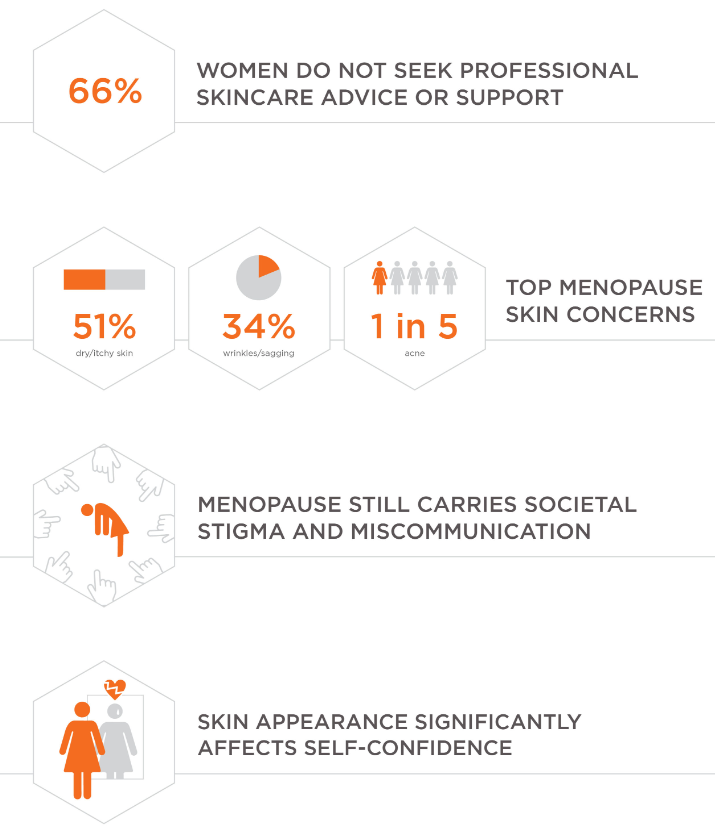Understanding menopausal skin changes and skincare

In recognition of World Menopause Day, held annually on 18th of October, Environ Skincare is focusing efforts on raising awareness about the effects of menopause on the skin though an educational campaign. Looking at menopause through a skin lens, global professional skincare brand Environ has undertaken research into the effects of it on skin.
“Menopause is inevitable for all women. It’s phase during which women experience significant physical, psychological, and aesthetic changes, along with the associated stressors, that can have a profound impact on their overall well-being,” says globally acclaimed plastic surgeon and Environ Founder Dr Des Fernandes.
With the number of menopausal women worldwide estimated to reach 1.1 billion by 2025, Environ conducted a consumer study to gather insights that would enable the brand to make a meaningful contribution towards supporting women in their well-being and promoting age-inclusive beauty. A group of over 800 female respondents from 45-59 years old, were surveyed about the physical effects of menopause on the skin.
The effects of menopause on the skin
All skin cells are shown to have receptors for oestrogen and other hormones, which is an indication of the vital role these hormones play in the healthy functioning of skin. During the menopause transition, the decline of these hormones is known as shut-down the hormone receptor systems in the skin, which results in the changes that women typically experience. Some of the significant skin changes experienced during menopause include:
- Dryness
- Loss of volume
- Lines, wrinkles and sagging skin
- Acne flare-ups
- Photo-damage
Environ’s research revealed, that despite experiencing significant changes to skin during menopausal phases, 66 percent of women have not sought out professional skincare advice or treatments to assist with these skin concerns.
When asked what the most visible effects of perimenopause or menopause are on the skin, 51 percent of respondents stated dry, itchy skin and over 34 percent cited wrinkles, sagging and loss of volume. One in five respondents suffered acne flare ups.
When asked how respondents felt about the effects of menopause on their skin, only 13 percent were accepting of it. The overwhelming majority used descriptors such as ‘sad’, ‘awful’, ‘embarrassed’ and frustrated. Some women even felt the need to ‘cover up’ and that their skin made them feel ‘unattractive’ and ‘depressed’.

Environ Consumer Study on the Effects of Menopause, 2023
Treating menopausal skin concerns
Dr Fernandes believes that many women don’t recognise the value of skincare professionals and their support in managing menopausal skin concerns.
“Skincare professionals can help a great deal by providing personalised expert recommendations on home skincare and professional treatments,” says Dr Fernandes. “Menopause is as individual as a person’s own genetics when it comes to the symptoms and effects on the skin, which makes personalised advice even more important.”
Skin is known to lose up to 30 percent of its collagen in the first five years of menopause. The relative expression levels of oestrogen and progesterone start to decline from the perimenopausal years onward, as women enter a predominantly deficient state. As oestrogen hormones decline, collagen production decreases, and the moisture components of the skin barrier function become impaired.
Dr Fernandes says, “Oestrogen plays a role in stimulating the production of collagen and glycosaminoglycans such as hyaluronic acid. The decline of progesterone contributes to the deficiency of the skin’s natural oils and together, these compromised moisture components leave the skin susceptible to trans epidermal water loss.”
Vitamin A is the most powerful promoter of collagen and natural moisturising factors. As the pioneer and leading specialist in vitamin A skin science, Dr Fernandes maintains that the topical replenishment of vitamin A and antioxidants is the most effective starting point for women experiencing the effects of menopause on their skin.
“Without any doubt, the most important nutrient for beautiful skin before, during and after menopause is vitamin A. This essential skin nutrient controls the normalised activity of skin cells through its effects on cellular DNA, it promotes the healthy metabolism and differentiation of skin cells, and it’s also the most powerful promoter of the skin’s natural moisturising factors,” says Dr Fernandes.
Environ’s philosophy is to combine vitamin A with potent antioxidants such as vitamin C and E, as well as specialised Peptide Technology, so that the skin can synthesise healthier collagen and build optimal natural collagen levels before menopause.
- Follow Environ’s #MenopauseConversations on social media: @environ.nz
- Learn more about the Effects of Menopause on Skin
Main image: Environ
